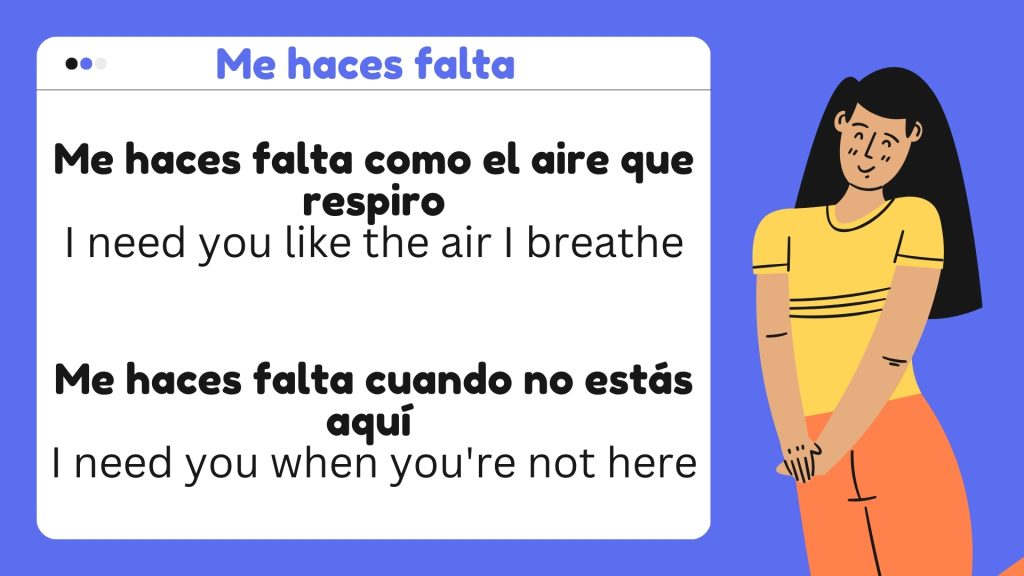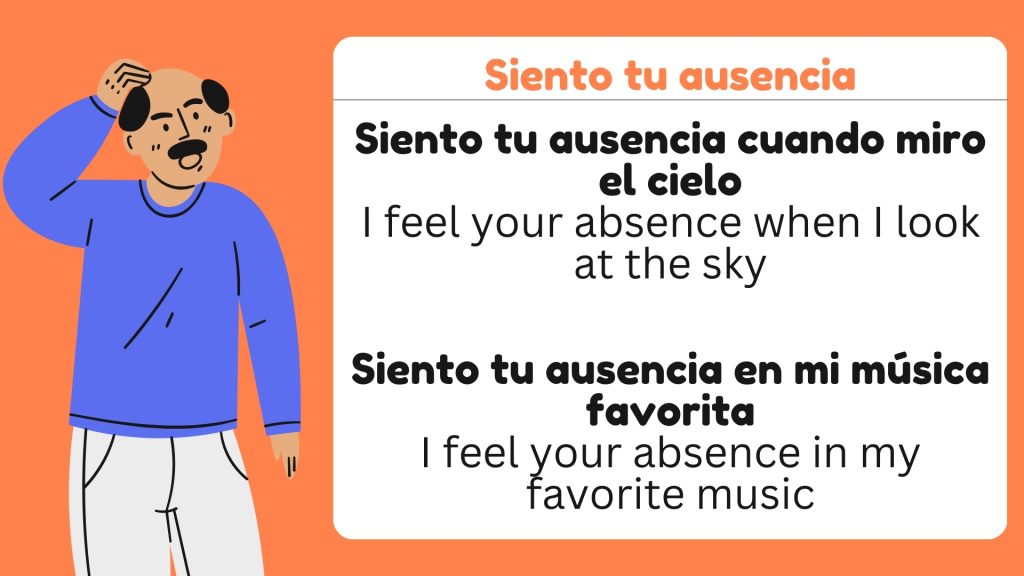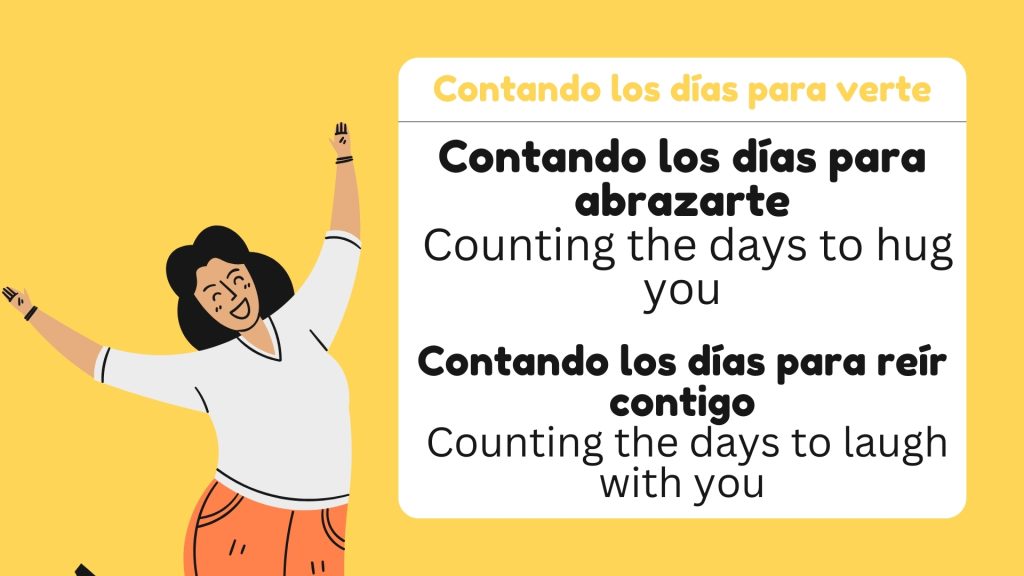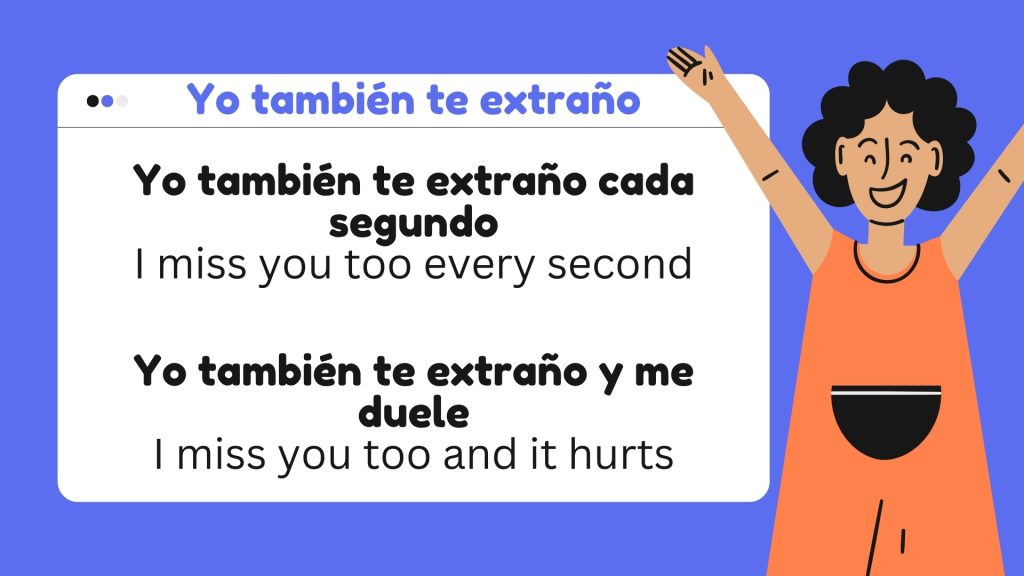When we dive into how Spanish speakers say ‘I’ll miss you,’ with phrases like ‘Te echaré de menos’ and ‘Te voy a extrañar,’ it’s more than just words. These phrases show how differently people express missing someone, showing a lot about their culture without saying it directly.
By looking at these, we start to see how language shapes the way we express feelings. Let’s talk about what this means in our relationships and how it might change depending on where someone is from. What do these little differences tell us about where they come from?
Different ways to say “I miss you” in Spanish
In Spanish, there are many ways to say ‘I miss you,’ each with its own level of intensity. You might just say ‘Te extraño’ which means ‘I miss you.’ If you’re feeling it deeply, you might add ‘mucho,’ making it ‘Te extraño mucho’ or ‘I miss you so much.’
It’s all about matching the feeling to the phrase.
1. Me haces falta
This phrase means I need you and is deeper than just missing someone. It shows their absence leaves a hole in your life.
- Me haces falta cuando no estás aquí – I need you when you’re not here
- Me haces falta más de lo que imaginaba – I need you more than I imagined
- Me haces falta cada mañana al despertar – I need you every morning when I wake
- Me haces falta como el aire que respiro – I need you like the air I breathe
- Me haces falta más que el café en la mañana – I need you more than morning coffee

2. Echo de menos
A softer, reflective way to say I miss you, often used in Spain.
- Echo de menos tus abrazos – I miss your hugs
- Echo de menos nuestras charlas nocturnas – I miss our late-night talks
- Echo de menos tu risa en mi día – I miss your laughter in my day
- Echo de menos cuando solíamos caminar juntos – I miss when we used to walk together
- Echo de menos esos pequeños momentos contigo – I miss those little moments with you
3. Te extraño como nunca
This phrase means I miss you like never before, ideal for strong emotional moments.
- Te extraño como nunca en esta noche fría – I miss you like never before on this cold night
- Te extraño como nunca lo había hecho – I miss you like I never have before
- Te extraño como nunca pensé que lo haría – I miss you like I never thought I would
- Te extraño como nunca desde el primer adiós – I miss you like never before since the first goodbye
- Te extraño como nunca, cada segundo sin ti – I miss you like never before, every second without you
4. Siento tu ausencia
A poetic way to express that their absence is felt deeply, even silently.

- Siento tu ausencia en cada rincón de la casa – I feel your absence in every corner of the house
- Siento tu ausencia cuando miro el cielo – I feel your absence when I look at the sky
- Siento tu ausencia en mi música favorita – I feel your absence in my favorite music
- Siento tu ausencia hasta en el silencio – I feel your absence even in the silence
- Siento tu ausencia y duele más de lo que esperaba – I feel your absence and it hurts more than I expected
5. Me haces falta en el alma
Use this when you feel their absence deep in your soul, beyond words.
- Me haces falta en el alma, como un hueco que no se llena – I need you in my soul, like a hole that won’t fill
- Me haces falta en el alma cuando me siento perdido – I need you in my soul when I feel lost
- Me haces falta en el alma cada noche que paso sin ti – I need you in my soul every night without you
- Me haces falta en el alma y no sé cómo explicarlo – I need you in my soul and I don’t know how to explain it
- Me haces falta en el alma como un amor que no se olvida – I need you in my soul like a love that can’t be forgotten
6. No es lo mismo sin ti
Use this for daily life situations that feel incomplete without them.
- No es lo mismo sin ti en casa – It’s not the same without you at home
- No es lo mismo sin ti en mis días – My days aren’t the same without you
- No es lo mismo sin ti en las fiestas – Parties aren’t the same without you
- No es lo mismo sin ti en mis planes – My plans aren’t the same without you
- No es lo mismo sin ti y nunca lo será – It’s not the same without you, and it never will be
7. Te llevo en mi mente todo el día
Use this when you can’t stop thinking about them, all day long.
- Te llevo en mi mente todo el día, sin parar – I carry you in my mind all day, nonstop
- Te llevo en mi mente todo el día desde que te fuiste – I carry you in my mind all day since you left
- Te llevo en mi mente todo el día, aunque no lo digas – I carry you in my mind all day, even if you don’t say it
- Te llevo en mi mente todo el día y en mis sueños también – I carry you in my mind all day and in my dreams too
- Te llevo en mi mente todo el día como un eco – I carry you in my mind all day like an echo
8. Me duele no verte
Use this when the pain of missing them becomes physical or emotional.
- Me duele no verte cuando más te necesito – It hurts not to see you when I need you most
- Me duele no verte en mis momentos felices – It hurts not to see you during my happiest moments
- Me duele no verte al final del día – It hurts not seeing you at the end of the day
- Me duele no verte y no saber cuándo volverás – It hurts not to see you and not know when you’ll return
- Me duele no verte aunque te sienta cerca – It hurts not seeing you even if I feel you close
9. Contando los días para verte
Use this when you’re apart but already waiting for the reunion.

- Contando los días para verte otra vez – Counting the days to see you again
- Contando los días para abrazarte – Counting the days to hug you
- Contando los días para reír contigo – Counting the days to laugh with you
- Contando los días para no extrañarte más – Counting the days to stop missing you
- Contando los días para que vuelvas a casa – Counting the days until you come back home
10. Tu ausencia pesa más cada día
When every day apart feels heavier than the last.
- Tu ausencia pesa más cada día sin ti – Your absence weighs more every day without you
- Tu ausencia pesa más en las noches largas – Your absence feels heavier during long nights
- Tu ausencia pesa más en mi corazón – Your absence weighs more in my heart
- Tu ausencia pesa más cuando todo me recuerda a ti – Your absence feels heavier when everything reminds me of you
- Tu ausencia pesa más y no sé cómo aliviarlo – Your absence weighs more and I don’t know how to ease it
Discover the trickiest Spanish words to spell and how to master them.
How to Respond to “I Miss You” in Spanish
When someone tells you they miss you in Spanish, there are simple, direct ways to respond.
You can say, ‘Yo también te extraño’ which means ‘I miss you too.’
These replies keep your connection strong and show you care.
1. Yo también te extraño
The simplest and most honest way to say I miss you too.

- Yo también te extraño cada segundo – I miss you too every second
- Yo también te extraño más de lo que crees – I miss you more than you think
- Yo también te extraño y me duele – I miss you too and it hurts
- Yo también te extraño hasta en mis sueños – I miss you even in my dreams
- Yo también te extraño desde lo más profundo – I miss you from the deepest part of me
2. Más de lo que imaginas
A mysterious and deep response. It adds emotion without saying too much.
- Más de lo que imaginas, mi amor – More than you imagine, my love
- Más de lo que imaginas y siento cada parte – More than you imagine, and I feel every part of it
- Más de lo que imaginas, aunque no lo diga – More than you imagine, even if I don’t say it
- Más de lo que imaginas, cada día – More than you imagine, every day
- Más de lo que imaginas, con todo mi corazón – More than you imagine, with all my heart
3. Estoy contando los días para verte
Matches their longing with hopeful excitement.
- Estoy contando los días para verte de nuevo – I’m counting the days to see you again
- Estoy contando los días para abrazarte fuerte – I’m counting the days to hug you tight
- Estoy contando los días para borrar esta distancia – I’m counting the days to erase this distance
- Estoy contando los días porque sin ti no es igual – I’m counting the days because nothing feels right without you
- Estoy contando los días para volver a ser feliz – I’m counting the days to be happy again
4. Me haces mucha falta también
An emotional response that matches their intensity.
- Me haces mucha falta también, más de lo normal – I need you too, more than usual
- Me haces mucha falta también en todo lo que hago – I need you too in everything I do
- Me haces mucha falta también, no sabes cuánto – I need you too, you don’t know how much
- Me haces mucha falta también desde que amanecí – I’ve needed you too since I woke up
- Me haces mucha falta también cada noche – I need you too every night
5. Sin ti, mis días no brillan igual
Adds a poetic and loving reply to their message.
- Sin ti, mis días no brillan igual ni con sol – Without you, my days don’t shine, even with sunlight
- Sin ti, mis días no brillan igual aunque lo intenten – Without you, my days can’t shine, no matter how they try
- Sin ti, mis días no brillan igual desde que partiste – My days haven’t shined the same since you left
- Sin ti, mis días no brillan igual y lo siento – Without you, my days don’t shine and I feel it
- Sin ti, mis días no brillan igual por más que lo esconda – My days don’t shine without you, no matter how I hide it
Explore more Spanish vocabulary starting with Q to spice up your language skills.
Conclusion
In Spanish, there are many ways to say you miss someone. Each phrase has its own little twist, showing how you feel differently.
When you know these phrases, you can really connect with people. You show you understand not just their words, but also their feelings.
Being good at this helps keep your relationships strong, even when you’re not close by.
Start your journey to mastering new languages at Lingua Viva.
Dayron is co-owner, and the heart of Lingua Viva. He is a licensed Educator and Interpreter with 15+ years of experience, and holds a graduate degree in Foreign Language Instruction. A native Caleño who creates a comfortable environment for his students. Dayron is loved by all and inspires confidence in his students when learning and speaking Spanish. He is also an avid comedian that loves to dance salsa.











